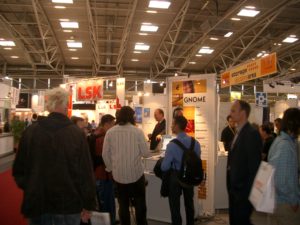I will almost certainly not be running for the GNOME board this time. There's still important things to do, but I only planned to be useful for one year, and I really need to reclaim some time by giving up some responsibilities. In the second half of this year I haven't even had enough time for the few hours that the Board needs per week. The first half of the year was consumed largely by GUADEC Stuttgart, though GUADEC never needs to be that difficult.
It's been a pleasure to work with the Board this year, and it's tempting to try to get elected again just so I can keep meeting these wonderfully talented people.
This board has dealt with (or 99% dealt with) several issues that had been dragging on for the previous year or so, but it needs to be even more decisive. I've been thinking about who would be good for next year. So, in no particular order, and probably forgetting some very useful people:
- Dave Neary. I know that Owen doesn't plan to run again, so I think Dave Neary would make a perfect chairman. Owen has done a great job, but I think Dave will be even more ready to bring things to constructive conclusion. He's already shown an extraordinary ability to get things done while judging what the community wants. Incredibly, he achieves that while upsetting almost nobody. Give him a mandate to do even more, even faster.
- Quim Gill is organising this year's GUADEC in Barcelona. I've been impressed by his commitment and ability to work with the Board, the community, local government and business. My experience this year showed me that being on the Board is a big help when organising a GUADEC.
- Daniel Veillard: has said that he's thinking of not running this year. I hope he changes his mind, because his minute-taking does so much to keep meetings on track. He's also often the voice of the non-commercial community. And he has a great French accent.
- German Poo Caamano is very active in South America, and has lots of ideas to do even more with the Board's support. When I met him in Stuttgart, I could tell that he has real people skills, but doesn't forget that there's important stuff that needs to be done.
Federico Mena-Quintero has given lots of his time and expertise for detailed tasks such as the trademark agreement and the documentation plan/contract. Let's have some more of that.- Jonathan Blandford has also given large chunks of his personal time, sorting out our finances and trademark agreement, while always being good-natured and light-hearted. His experience would be useful next year.
- Luis Villa has effectively pushed for accountability and efficiency,
and he seems ever more capable of
dealing with other non-profits and legal issues. He understands the need for marketing at this stage. He's even becoming
concise – not an easy habit to learn.

